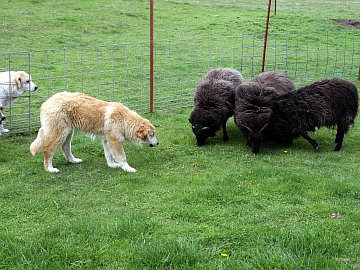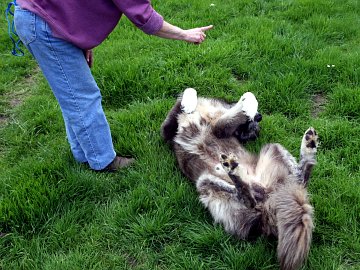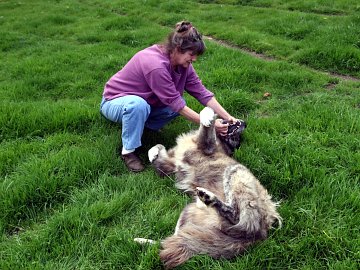~~* Black Sheep Newsletter............Issue 132............Summer 2007 *~~
 †
†
THE HOMESTEAD: Live Stock Guardian Dogs part II
PART II – LIVESTOCK GUARDIAN DOGS --- continued interview of Cis Hanson:
8. How about your training practices with the LGDs, Cis?
I pretty much let my dogs choose their area of "patrol" and preferences of who to protect. Though they all go through a training period where they get a taste (not literal) of everything on the farm, they ultimately choose where they want to be and sometimes choose to work alone or, as with two present females I have, they choose to work with another. All of my working dogs have to go through what I term 'yard duty.' That includes their mingling with many cats, poultry and even working a portion of the yard that is not fenced and goes into wilderness.
The dogs bond with what they know from an early age. I do my best to see that my young dogs are acquainted with all sorts of livestock AND neighborhood children. All of this is a MUST.
I seldom touch the dogs. Remember, these are not "pets." These are working dogs. Early on I do begin to teach them submission to me, however. I do this with a 'Head Down!" command and a raised hand over their head. That is usually all it takes and their instincts take over. I am showing dominance with this command and stance, and they respond readily by quickly go belly up.
Then while they are on their backs, I examine them from head to tail. I place my hands and fingers Inside the mouth, ears and eyes. I pull gently on their legs and examine their feet. A quick pat on the belly is all the reward they get and then I turn my back on them. They are NOT to follow. If they begin to follow, I quickly stomp on the ground much like an irritated ewe would do, which sends them scurrying. I do not want a LGD looking for attention while I am busy working on my livestock. I don't want an LGD that craves attention and affection from people. My dogs are first and foremost livestock guardians.![]()
9. What about running one LGD or two or three? Do they need "back ups?"
I have one dog with my goats in the back paddock right now. He works best alone and dearly loves his goats, though he does well with sheep also.
I've got three 5-month old pups out in the front paddock that I have been observing. Two are definitely a pair that work together well in all circumstances. The third is what I consider an alpha, dominant dog because she has not responded to her training well. She is overly friendly towards people (a no-no with me) and shows no fear with me, even as I employ the "head down" with her. She has done wonderfully with the sheep and has bonded very well with them. I have observed her chasing cats and chickens when she was on yard duty though she never did harm. Normally I would keep a dog like that here on this farm.
I call a dog like her a "cull", though some think my standards are a bit too high and the ones I call "culls" would be a treasure somewhere else.
In my view, culls are few and far between; I can make use of them here on Guinea Lane until they either grow out of their faults, which most often is the case, or they stay here permanently.![]()
Martha and Tooie are retired to yard duty now. They work well together but both work well alone. Toolie has had a hard time of it filling Klickitat's paw prints in Martha's eyes. We lost Klick last summer to heart failure. A very sad day for us all.![]()
Sooo... I guess the answer to your question is again, it depends on the dog.![]()
10. Fencing - what is best?
These dogs are indeed escape artists and will make their own boundaries no matter what we may think. No climb horse fence is my preference, but good old field fence with hot wire top and bottom will do the trick. The bottom wire can be high enough up to keep clear of grassy growth. It is not an easy task for a dog this size to dig and wiggle under a hot wire without getting nipped.
11. LGD night workers versus day workers – I've had both. Have you?

Black sheep being escorted
I have found my dogs to be mostly nocturnal. They do patrol throughout the day however and a sleeping dog can be on its feet amazingly fast and off at full throttle. I do believe their nose and ears keep working right through the soundest sleep.![]()
12. How about shy LGDs? Do they have their place? (I know the answer is yes, Cis, because my Mogen was a very shy dog and one of my best livestock guardian dogs.)
Some dogs do tend to be wilder of nature then others. I do not know if this is prevalent amongst the purebred dogs or just found within my particular line.
I have had satisfied customers with all personality types.
This is where it becomes very important to learn as much as I can about my customers' unique situation and what they are expecting of their LGD. I can usually do a good job of matching the right dog with the proper environment for success.
Though some people do prefer the more elusive and shy LGDs, the LGD that is out there in the fields for days with its charges (and only comes for its meals, easy to please) - there is always the problem of emergency care. These dogs are not easily approached and help could arrive too late.![]()
13. Feeding and health care, etc. These are big dogs for the most part – will they eat you out of house and home?
This is my opinion only but I have learned this from trial and error both on my own farm and learning from others.
The first 4 to 6 months I feed puppy chow or the equivalent of high protein food. After that I go for the cheapest dog food I can find with the lowest protein. Fast growth in these large breeds of dogs can sometimes cause problems. The LGD also has the advantage of added nutrients found in the livestock droppings that they nibble.
I've also found that if I keep up my wormings for the livestock, my LGD do not suffer from fleas, ticks and ear mites as my house and yard pets do. I asked several Veterinarians about this and it seems that the manure nibbles do indeed help with common pests as well as supplements the diet.
The ideal situation is for the LGD to have a creep of sorts where they are free to feed at their leisure without the stock having access. Not always an easy accomplishment, especially with goats. I like to feed free choice dry food. If the dog never knows hunger it is less likely to gulp its food, which can cause serious and sometimes fatal results.
As far as these big dogs eating a lot more food than medium sized breeds, for instance, it's amazing but true that they don't have huge appetites.![]()
AUTHOR'S NOTE: Except for the occasional "glutton" like our Uzi, the Kuvasz, but that's another story altogether.![]()
Back to Cis Hanson on Care of LGDs: Foot care is always a concern. These dogs work hard while on patrol, sometimes on very rough terrain.
I remove the dew claws at birth on my pups which will hopefully cut down on potential injuries later. I also keep hair trimmed between the toes during the worst of the foxtail season. Some people shear their dogs along with their sheep.
Preventative measures are definitely worth the time if this will help keep your dog active and on the job throughout the seasons.![]()
14. You spoke earlier about "submission" shown to you by these gentle giants, as you often call them. Can you elaborate? Why is that so important?
Making sure your LGD knows the submissive posture 'belly up' can prove invaluable. I have on occasion had to pull teeth from injured dogs. I've never had a fear biter and the dogs have shown complete faith in me.
I have my adult breeding dogs x-rayed for soundness at two years of age. My Veterinarian has never had to use anesthesia before the x ray. A simple 'Head Down" and the dog freezes in position on the table.
Early training and consistent weekly examinations keep this natural instinct deeply ingrained. The dogs and I learn to trust one another and I believe that communicating with them in this way reinforces our own personal bond and relationship.![]()
15. What do you especially like to see in your dogs? What shows you that you have a really good LGD?
Again, and I can't say it enough, every dog is so individual.
I love and respect each one of my big dogs as I would friends.
By far my favorite was Klickitat, for he and I had a special bond. I hate using him for an example for I might have to admit that he was what I call a cull. Not salable.
He was badly beaten with a golf club when he was about 6 months old by a neighbor who knew no better. He had escaped his paddock and was investigating the neighborhood when she became frightened of this big dog and took the club to him.
I do not blame the neighbor. Even at 6 months, Klickitat was quite a large animal and LGDs do tend to 'grin' when they approach strangers. (This 'smile' is merely a show of submission by the dog but looks like 'bared fangs' to one that is not familiar with the ways of the LGD.)
This experience left a deep scar on Klickitat and he could never be trusted around men after that. I had to keep him double fenced at all times.
Aggression towards people is something I do not tolerate among any of my dogs but I could not find it in my heart to put Klick down.
As a matter of fact, neither could my Veterinarian, for I did take Klick in to be put down one day. The Vet shook his head as he watched my dear big dog laying 'belly up' in the middle of his examination room. "Oh for crying out loud, Cis. Take this dog home and let him do his job. Just keep those gates closed good and tight." That is exactly what he said, too.
Klickitat became my most treasured LGD (and friend) due to his uncanny ability to know exactly what was expected of him at all times even beyond his primary duties as a working dog.
Klickitat started traveling with me when I would deliver pups to their new owners. His presence seemed to calm the pups and we would hang around long enough for Klick to convey to these young dogs that this was now 'their' territory. He would walk them dutifully around the pastures marking territory for them so they would know their new boundaries. After all seemed settled to his standards, he would dutifully load up in the back of the truck, anxious to head back to his own beloved critters.
Though he was not to be trusted around strangers, particularly men, within his territory... (it was HIS territory after all) he was predictably tolerant when we were on the road. He especially loved children and I never feared to leave even the smallest child in his care. When the neighborhood children wanted to walk in the bear and cougar infested wilds above our property, Klick would dutifully submit to the collar and lead and surrounded by a half dozen children off he would go.![]()
He attended me on my own walks in the wilderness also, though he never was all that happy about leaving his own turf. He would let me know this with his big expressive eyes. If I should stop for a rest he would wander off into the deep woods and find a cool spot where he could keep an ever watchful eye on me.
We became best friends Klickitat and I. Our mutual respect for one another grew throughout the passing years.![]()
I was not with him when he passed. My husband found him as if asleep behind the shed where he liked to rest during the heat of the day. Tears filled our eyes as we layed him to rest, his great head resting upon his paws, forever guarding the back paddock and the livestock that he loved so much.![]()
16. What is a livestock guardian dog?
No expert here, but it is my understanding that these dogs that have been bred over hundreds if not thousands of years to fit a much needed niche. Their over developed maternal/paternal instincts are a result of selective breeding. The pack/flock/herd instincts are remarkably similar, or so I have witnessed with my own dogs. Actually I do not consider LGDs dogs at all. They think for themselves and and their social order reminds me more of what one would see in a wolf pack.![]()

"Down!" command
17. Discipline of an LGD (how to go about it...is it wrong to discipline them...do they listen to discipline?)
I have spent years trying to learn 'their' language. I do believe they understand my body language much better then my voice commands. Since these dogs live with sheep and goats I have watched the way they communicate and try to mimic this as closely as possible.
The 'head down' is very reminiscent of a wolf pack reinforcing their social order.
One thing that I feel very strongly about is that one should never hit, beat or slap at a LGD. These are highly intelligent and very sensitive animals and it is my experience that they do not forgive nor forget insults easily.
If discipline is needed, I do my best to work with the LGD to make it understand what I want it to do. If all else fails, I put the dog in an environment that best suits its own personality.![]()
One example would be my stud dog, Toolie. He is a very devoted guardian and absolutely adamant that he wants nothing more than to be a parent. Unfortunately, the only male dog that Martha has ever allowed to enter her den (shed) has been her altered brother Klickitat.![]()
Well, good old Toolie took to stealing lambs during his stint during lambing season. He never damaged lamb nor ewe, but was relentless in his attempts to nurture the new babes. I had to fix that somehow. So, I changed his paddock.![]()
Toolie has since had to spend his life as a ram dog. Not the most pleasant of jobs, but he has done an outstanding job in his devotion to his wards. Since Toolie has been upgraded to yard dog, I have had to watch him when we happen to have baby chicks or ducklings about.
Yes he is a chick stealer too. It's quite comical to see this big dog laying out by the creek with a wee fowl running around him, jumping on his back and nestling into his fur. If Toolie gets up to relocate, I have watched him simply slurp the tiny bird into his massive jaws and find a more comfortable setting. He then blows (not spitting) the chick gently onto the ground and settles down beside it as it goes about its business of pecking through the grass.![]()
I eventually rescue the wee one and return it to its true mother. I've observed this behavior of Toolie's on at least three occasions and now keep chicks safely in their hen house until they are old enough to learn just who their real mothers are.![]()

Examining teeth
18. What do you like to see in livestock guardian dogs - and do you begin to see it rather early?
I watch for early bonding with the livestock, social order among the pups and special bonds between the pups. Some I will not separate. Others prefer to work alone and show this rather early on. Some pups will wander off at 3 weeks of age and begin spending time with the less aggressive animals I have near them. Frequently they will be butted hard by an angry sheep, but this is something they have to learn to endure. I've never had a pup or dog seriously hurt by a sheep or goat and I do not intervene in this most important social order interaction.
My line of dogs tend to began working in earnest at about 4 months of age. They will go through the 'teen months' somewhere between 6 months to two years of age. This can be a trying time, but I again try not intervene unless absolutely necessary. The 'teen months' may include an increase in playfulness, increased interest in wandering or expanding their territory or even chasing the animals they are there to protect. Most pups (and livestock) have learned their place within the pecking order by this time and usually the livestock puts the over exuberant pup in its place.![]()
By two years of age they should be completely settled independent working dogs. Some dogs never go through the teen months at all. And it seldom lasts for more than a few months. Relocating a dog to a more appropriate environment as I did with Toolie might be an answer for a fault that is not going to remedy itself.![]()
------------------------------
Alexandra Scribe
Homestead Home
TOP






